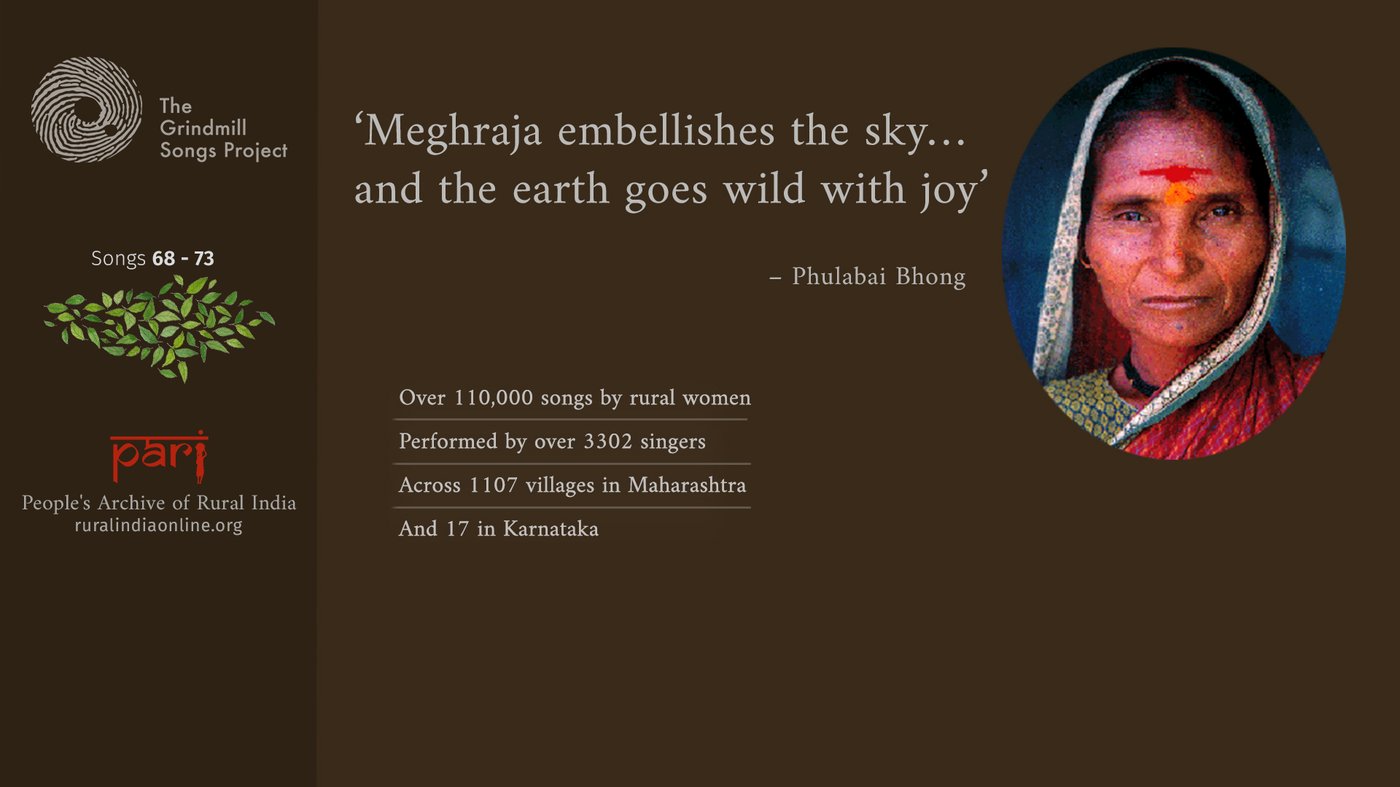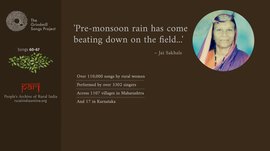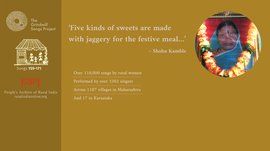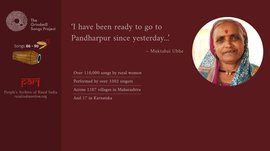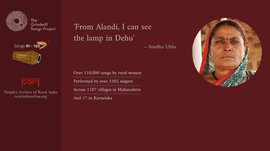The cow’s ‘sons' refers to the farmer and the bullock in one of the six ovi in this edition of the Grindmill Songs Project on PARI. These songs, by Phulabai Bhong of Nimgaon Ketki village in Pune district, speak of anxiety due to a lack of rain and the joy that rainfall brings
The verses in this instalment of the Grindmill Songs Project tell us what it is like when it doesn’t rain and how it feels when it does. The performer, Phulabai Bhong, sings memorable and hummable melodies in her deep voice.
She starts by telling Meghraja (the Rain King) that he did well by falling and pouring out of the sky the way he did because the bullock could drink water from the small rain-water filled furrow near the plough – the animal, it is implied, did not have to go to the pond source to quench its thirst.
Phulabai then sings that Megharaja has embellished the sky with a black mare – that is, a black cloud that portends rain. Seeing this black mare, the earth goes wild with joy.
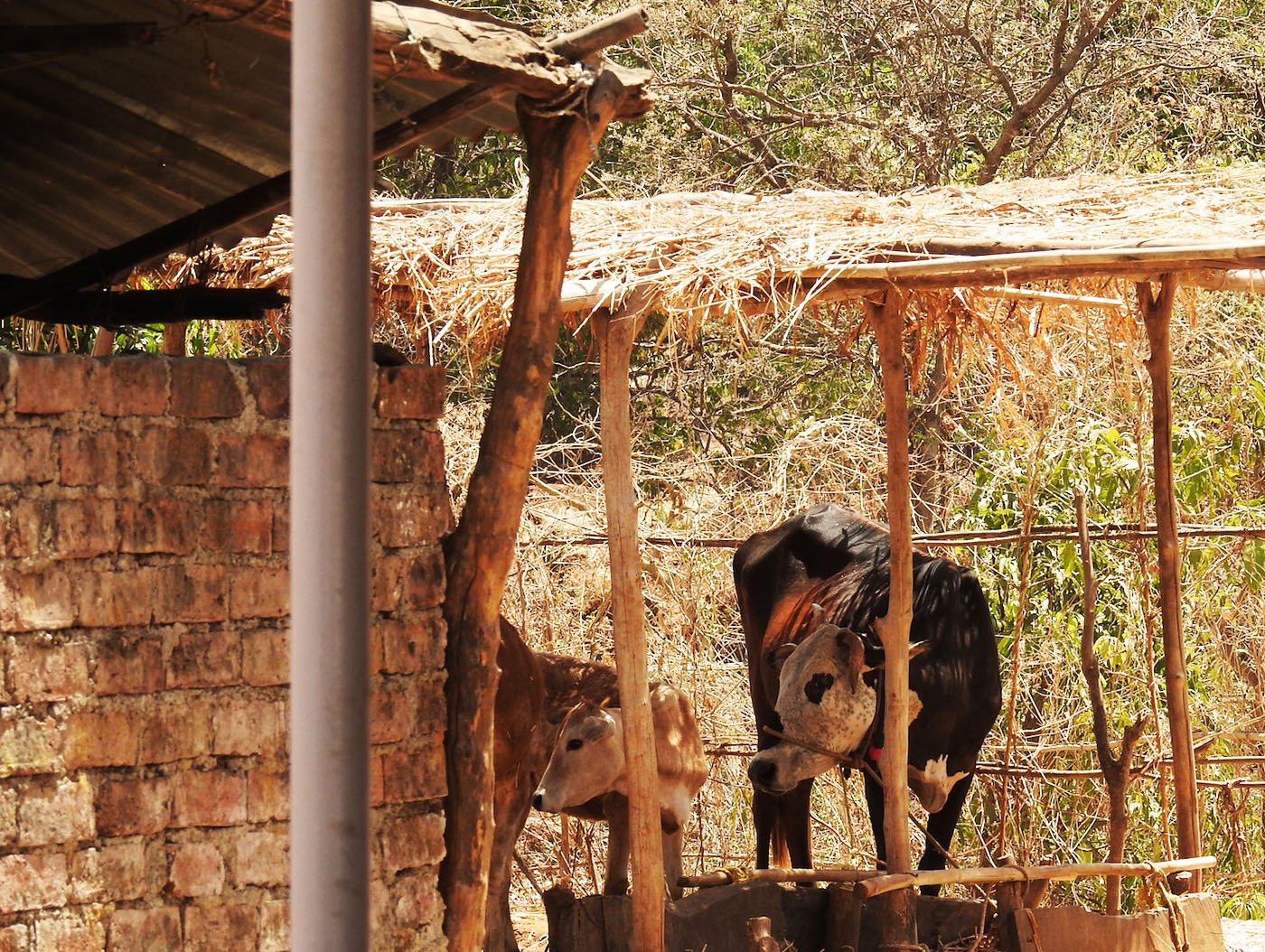
The third song uses the earth-rain pairing as a comparison to a woman and her husband. The singer tells us that just like the earth has no lustre without rainwater, a woman has no importance without a husband. This line in the ovi indicates the social status of women in rural India (and across most parts of India), where a married woman is given more respect than one who is unmarried or a widow.
When there is no timely rain, Phulabai asks Megharaja, “what is in your mind?” She sings that the sons of the cow – the farmer and the bullock – are both praying for rain in the fields. When there is not a drop of rain, the whole world worries and these sons of a cow have no choice but to fast.
In the sixth and the last ovi , the singer describes how good it is when it does rain. Phulabai addresses Meghraja and says that when the god pours water into the fields and everywhere, she is very happy because then the young offspring of man and sheep are able to quench their thirst.
पडं पडं तु मेघराजा, आत्ता पडूनी बरं केलं
नेनंत्या राघूबाचं, नंदी तासाला पाणी पेलं
अगं पडं तु मेघराजा यानं सजवीली काळी घोडी
यानं सजवीली काळी घोडी, सारी पिरतीम झाली येडी
पावूस पाणी नाही त्याजं नाही त्या जमिनीला
भरतारावाचूनी वजं नाही त्या कामीनीला
असा पावूस पाणी नाही, कायी तुझ्या रे मनामंदी
गायीच्या बाळाईनी हातं जोडीले रानामंदी
असा पावुस पाणी नाही, सरवी दुनीया गांजयली
अग गायीच्या बाळायानी, कशी रोजना मांडीयली
पडं पडंतु मेघराजा, सार्या माळानी पाणीपाणी
किती सांगू गं बाई तुला, मेंढ्या बाळाची बाळं तान्ही
paḍa paḍa tu mēgharājā āttā paḍūnī bara kēla
nēnantyā rāghūbāca nandī tāsālā pāṇī pēla
aga paḍa tu mēgharājā yāna sajavīlī kāḷī ghōḍī
yāna sajavīlī kāḷī ghōḍī sārī piratīma jhālī yēḍī
pāvūsa pāṇī nāhī nāhī tyāja tyā jaminīlā
bharatārāvācūnī vaja nāhī tyā kāmīnīlā
asā pāvūsa pāṇī nāhī kāyī tujhyā rē manāmandī
gāyīcyā bāḷāīnī hāta jōḍīlē rānāmandī
asā pāvusa pāṇī nāhī saravī dunīyā gāñjayalī
aga gāyīcyā bāḷāyānī kaśī rōjanā māṇḍīyalī
paḍa paḍatu mēgharājā sāryā māḷānī pāṇīpāṇī
kitī sāṅgū ga bāī tulā mēṇḍhyā bāḷācī pōra tānhī
Meghraja, you pour and pour, you did well to pour now
My young Raghoba’s bullock drank water from the furrow near the plough
Meghraja, you pour, you create a black mare
He decorated a black mare, the whole earth became wild with joy
No rain, no water, the soil has no lustre
Without a husband, the woman has no standing
There is not a drop of rain, what do you have in mind
The cow’s sons are both praying in the field
There is not a drop of rain, the whole world is worried
The cow’s sons are compulsorily fasting
Meghraja, you pour water in the fields and everywhere
How much can I tell you O woman, farmer and sheep both have young ones
Note: The singer is telling a neighbour that she is so happy that the young offspring of farmer and sheep have water to quench their thirst.
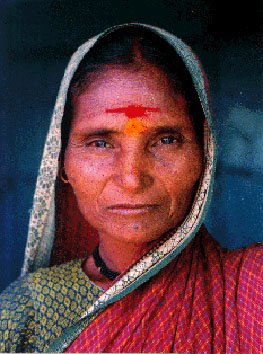
Performer/Singer: Phulabai Bhong
Village : Nimgaon Ketki
Taluka: Indapur
District: Pune
Caste: Phulmali (gardener)
Date: The information, photograph and songs here were recorded on December 11, 1995.
Photos: Hema Rairkar and Namita Waikar
Poster: Shreya Katyayini
